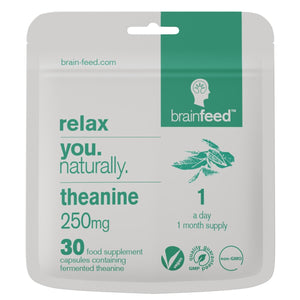The perfect blend: l-theanine and caffeine for caffeine jitters
filter
The glory of a morning coffee is incomparable. It tastes amazing and it wakes you up. Then comes lunchtime. Sometimes it feels nice to have a cup of coffee after eating. You drink “just one more” in the afternoon to keep you awake longer. Sooner or later you start feeling the jitters; the more coffee you consume, the more likely it is you’ll begin to feel them. Learn how much coffee is just enough to keep you feeling good and awake while you get the job done and discover the effects that l-theanine in combination with caffeine has on you.
The benefits of coffee
Do you feel like a cup of coffee helps you function properly in the morning? You might be on to something. Caffeine is a natural stimulant that increases your brain and nervous system activity. What exactly is the effect of caffeine on the brain? Besides the beautiful aroma, coffee has several other benefits. A UK researcher did an extensive literature review of 41 studies on humans[1 Trusted Source 2008 - Nutrition Bulletin Systematic and meta-analysis The impact of caffeine on mood, cognitive function, performance and hydration: a review of benefits and risks ] . The results showed that low to moderate caffeine intake which is anywhere from around half an espresso shot (37.5mg) to seven espresso shots (450 mg) per day has benefits for physical endurance, cognitive function, mood and perception of fatigue of the participants.
Contrary to l-theanine, caffeine was also shown to help with global processing, meaning that if someone came to a new city with a cup of coffee in their hands, they’d be more focused on the famous landmarks than the architecture of the buildings next to the landmarks[2 Trusted Source 2017 - Canadian Journal of Physiology and Pharmacology Human study Caffeine and theanine exert opposite effects on attention under emotional arousal ] .
Caffeine jitters
Can caffeine cause anxiety? The results of a study on 24,197 French participants suggest that higher caffeine intake is associated with higher odds of general anxiety among women[3 Trusted Source 2022 - Nutrients Human study Caffeine Intake and Its Sex-Specific Association with General Anxiety: A Cross-Sectional Analysis among General Population Adults ] . The Food and Drug Administration agency recommends 6 or fewer shots of espresso per day because an amount of caffeine that’s higher than 400mg was shown to cause the so-called caffeine jitters[4 Trusted Source 2018 - U.S. Food & Drug Administration 3rd-party source Spilling the Beans: How Much Caffeine is Too Much? ] . Caffeine is a psychostimulant with similar effects on the nervous system like cocaine and amphetamine[5 Trusted Source 2014 - National Academies Press 3rd-party source Caffeine in Food and Dietary Supplements: Examining Safety: Workshop Summary. ] . When you get too much caffeine, your body starts responding as though it’s under a lot of stress. You may feel anxious and nervous. You can also experience heart palpitations or trouble breathing.
Keeping your calm
L-theanine is a compound found in green tea[6 Trusted Source 2011 - Journal of the Science of Food and Agriculture Research evaluation L-Theanine: properties, synthesis and isolation from tea ] . It contributes to the flavour of tea and it helps you relax while still keeping you alert[2 Trusted Source 2017 - Canadian Journal of Physiology and Pharmacology Human study Caffeine and theanine exert opposite effects on attention under emotional arousal ] , [6 Trusted Source 2011 - Journal of the Science of Food and Agriculture Research evaluation L-Theanine: properties, synthesis and isolation from tea ] , [7 Trusted Source 2011 - Journal of Functional Foods Human study Effects of l-theanine on attention and reaction time response ] . L-theanine helps your body increase the relaxation chemical named GABA and the alpha brain waves that keep you focused[8 Trusted Source 2022 - Cleveland Clinic 3rd-party source Gamma-Aminobutyric Acid (GABA) ] , [9 Trusted Source 2019 - Psychology Today 3rd-party source 3 Amazing Benefits of GABA ] , [10 Trusted Source 2008 - Asia Pacific Journal of Clinical Nutrition Human study L-theanine, a natural constituent in tea, and its effect on mental state ] . Studies have shown that l-theanine has beneficial effects on stress and anxiety levels[11 Trusted Source 2020 - Plant Foods for Human Nutrition Systematic and meta-analysis The Effects of Green Tea Amino Acid L-Theanine Consumption on the Ability to Manage Stress and Anxiety Levels: a Systematic Review ] , [12 Trusted Source 2022 - Food Science and Human Wellness Research evaluation How does the tea L-theanine buffer stress and anxiety ] . An Australian literature review team examined 9 studies which assessed the effects of l-theanine on participants[11 Trusted Source 2020 - Plant Foods for Human Nutrition Systematic and meta-analysis The Effects of Green Tea Amino Acid L-Theanine Consumption on the Ability to Manage Stress and Anxiety Levels: a Systematic Review ] . They concluded that l-theanine assists in the reduction of stress and anxiety in people exposed to stressful conditions. Another literature review examined human studies on a more in-depth level[12 Trusted Source 2022 - Food Science and Human Wellness Research evaluation How does the tea L-theanine buffer stress and anxiety ] . They concluded that the anti-anxiety effects of L-theanine may vary depending on the intensity of the anxiety but that l-theanine alleviated the initial stress and anxiety.
Purely natural l-theanine
L-theanine, the relaxant amino acid, can be found in green and black tea. The human body is unable to produce this compound by itself therefore you have to make sure your intake is adequate if you want to reap the effects.
brain feed’s L- theanine is a natural fermented form of theanine. It’s kept as pure as possible to ensure all the science-based results. If you’re a new customer, use the code ‘NEW15’ at the checkout to get 15% off your first purchase.
Balancing the buzz with l-theanine and coffee?
The hype behind taking l-theanine and caffeine together is rapidly growing on social media. But what is the science behind it?
There were four studies conducted from 2008 to 2015 examining the effects of l-theanine in combination with caffeine on mood[13 Trusted Source 2015 - Psychopharmacology Human study A double-blind, placebo-controlled study evaluating the effects of caffeine and L-theanine both alone and in combination on cerebral blood flow, cognition and mood ] , [14 Trusted Source 2013 - Nutritional Neuroscience: An International Journal on Nutrition, Diet and Nervous System Human study The combined effects of L-theanine and caffeine on cognitive performance and mood ] , [15 Trusted Source 2012 - Journal of Physiological Anthropology Human study Effects of L-theanine or caffeine intake on changes in blood pressure under physical and psychological stresses ] , [16 Trusted Source 2008 - Psychopharmacology Human study Time for tea: mood, blood pressure and cognitive performance effects of caffeine and theanine administered alone and together ] . A UK study on 48 healthy adults found that l-theanine helps lower the blood pressure that the caffeine has boosted[16 Trusted Source 2008 - Psychopharmacology Human study Time for tea: mood, blood pressure and cognitive performance effects of caffeine and theanine administered alone and together ] . An analysis of 15 studies suggests that theanine alone and in combination with caffeine could be beneficial for cognitive and mood outcomes[17 Trusted Source 2025 - Nutrition reviews Human study Effects of Tea (Camellia sinensis) or its Bioactive Compounds l-Theanine or l-Theanine plus Caffeine on Cognition, Sleep, and Mood in Healthy Participants: A Systematic Review and Meta-Analysis of Randomized Controlled Trials ] . However, results have shown that l-theanine had too small of an effect on the jitters for the scientists to conclude any kind of relationship between them. Therefore, other effects of l-theanine and caffeine taken together still remain to be confirmed.
References
[1] Ruxton, C. H. S. (2008). The impact of caffeine on mood, cognitive function, performance and hydration: A review of benefits and risks. Nutrition Bulletin, 33(1), 15–25. https://onlinelibrary.wiley.com/doi/10.1111/j.1467-3010.2007.00665.x
[2] Giles, G. E., Mahoney, C. R., Brunyé, T. T., Taylor, H. A., & Kanarek, R. B. (2017). Caffeine and theanine exert opposite effects on attention under emotional arousal. Canadian Journal of Physiology and Pharmacology, 95(1), 93–100. https://cdnsciencepub.com/doi/10.1139/cjpp-2016-0498
[3] Paz-Graniel, I., Kose, J., Babio, N., Hercberg, S., Galan, P., Touvier, M., Salas-Salvadó, J., & Andreeva, V. A. (2022). Caffeine Intake and Its Sex-Specific Association with General Anxiety: A Cross-Sectional Analysis among General Population Adults. Nutrients, 14(6), Article 6. https://www.mdpi.com/2072-6643/14/6/1242
[4] Spilling the Beans: How Much Caffeine is Too Much? (2018). U.S. Food & Drug Administration. https://www.fda.gov/consumers/consumer-updates/spilling-beans-how-much-caffeine-too-much
[5] Planning Committee for a Workshop on Potential Health Hazards Associated with Consumption of Caffeine in Food and Dietary Supplements; Food and Nutrition Board; Board on Health Sciences Policy; Institute of Medicine (2014). Caffeine Effects on the Central Nervous System and Behavioral Effects Associated with Caffeine Consumption. Caffeine in Food and Dietary Supplements: Examining Safety: Workshop Summary. Washington (DC): National Academies Press (US). https://www.ncbi.nlm.nih.gov/books/NBK202225/
[6] Vuong, Q. V., Bowyer, M. C., & Roach, P. D. (2011). L-Theanine: Properties, synthesis and isolation from tea. Journal of the Science of Food and Agriculture, 91(11), 1931–1939. https://scijournals.onlinelibrary.wiley.com/doi/10.1002/jsfa.4373
[7] Higashiyama, A., Htay, H. H., Ozeki, M., Juneja, L. R., & Kapoor, M. P. (2011). Effects of l-theanine on attention and reaction time response. Journal of Functional Foods, 3(3), 171–178. https://www.sciencedirect.com/science/article/pii/S1756464611000351?via%3Dihub
[8] Gamma-Aminobutyric Acid (GABA) (2022). Cleveland Clinic. https://my.clevelandclinic.org/health/articles/22857-gamma-aminobutyric-acid-gaba#:~:text=It%20slows%20down%20your%20brain,with%20anxiety%2C%20stress%20and%20fear
[9] Breus, M. J. (2019). 3 Amazing Benefits of GABA. Psychology Today. https://www.psychologytoday.com/gb/blog/sleep-newzzz/201901/3-amazing-benefits-gaba
[10] Nobre, A. C., Rao, A., & Owen, G. N. (2008). L-theanine, a natural constituent in tea, and its effect on mental state. Asia Pacific Journal of Clinical Nutrition, 17(S1), 167–168. https://apjcn.nhri.org.tw/server/APJCN/17%20Suppl%201/167.pdf
[11] Williams, J. L., Everett, J. M., D’Cunha, N. M., Sergi, D., Georgousopoulou, E. N., Keegan, R. J., McKune, A. J., Mellor, D. D., Anstice, N., & Naumovski, N. (2020). The Effects of Green Tea Amino Acid L-Theanine Consumption on the Ability to Manage Stress and Anxiety Levels: A Systematic Review. Plant Foods for Human Nutrition, 75(1), 12–23. https://link.springer.com/article/10.1007/s11130-019-00771-5
[12] Wang, L., Brennan, M., Li, S., Zhao, H., Lange, K. W., & Brennan, C. (2022). How does the tea L-theanine buffer stress and anxiety. Food Science and Human Wellness, 11(3), 467–475. https://www.sciencedirect.com/science/article/pii/S2213453021001324?via%3Dihub
[13] Dodd, F. L., Kennedy, D. O., Riby, L. M., & Haskell-Ramsay, C. F. (2015). A double-blind, placebo-controlled study evaluating the effects of caffeine and L-theanine both alone and in combination on cerebral blood flow, cognition and mood. Psychopharmacology, 232(14), 2563–2576. https://link.springer.com/article/10.1007/s00213-015-3895-0
[14] Owen, G. N., Parnell, H., Bruin, E. A. D., & Rycroft, J. A. (2013). The combined effects of L-theanine and caffeine on cognitive performance and mood. Nutritional Neuroscience: An International Journal on Nutrition, Diet and Nervous System, 11(4), 193–198. https://www.tandfonline.com/doi/abs/10.1179/147683008X301513
[15] Yoto, A., Motoki, M., Murao, S., & Yokogoshi, H. (2012). Effects of L-theanine or caffeine intake on changes in blood pressure under physical and psychological stresses. Journal of Physiological Anthropology, 31(1), 28. https://jphysiolanthropol.biomedcentral.com/articles/10.1186/1880-6805-31-28
[16] Rogers, P. J., Smith, J. E., Heatherley, S. V., & Pleydell-Pearce, C. W. (2008). Time for tea: Mood, blood pressure and cognitive performance effects of caffeine and theanine administered alone and together. Psychopharmacology, 195(4), 569–577. https://link.springer.com/article/10.1007/s00213-007-0938-1
[17] Payne, E. R., Aceves-Martins, M., Dubost, J., Greyling, A., & de Roos, B. (2025). Effects of Tea (Camellia sinensis) or its Bioactive Compounds l-Theanine or l-Theanine plus Caffeine on Cognition, Sleep, and Mood in Healthy Participants: A Systematic Review and Meta-Analysis of Randomized Controlled Trials. Nutrition reviews, nuaf054. Advance online publication. https://academic.oup.com/nutritionreviews/advance-article/doi/10.1093/nutrit/nuaf054/8123998


 alertness
alertness
 cognition
cognition
 sleep
sleep
 wellbeing
wellbeing








Leave a comment
Open tab